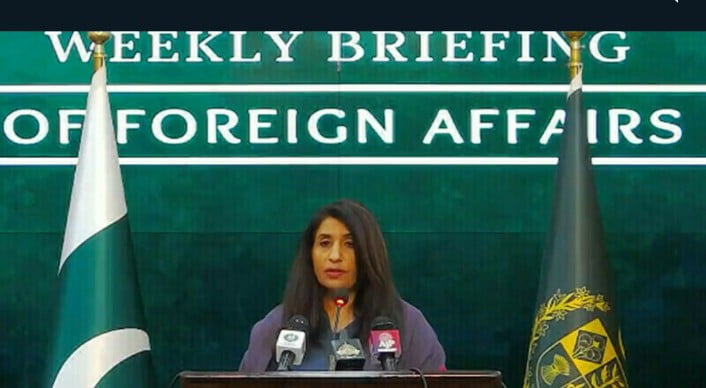In a nuanced revelation, the Foreign Office spokesperson, Mumtaz Zahra Baloch, declared that Pakistan had yet to formally present its application for membership within the consortium of emerging economies, BRICS. This disclosure was unveiled on Friday, resonating in the wake of the latest expansion of BRICS – initially comprising Brazil, Russia, India, China, and South Africa – which, intriguingly, incorporated additional nations including Saudi Arabia, Iran, Ethiopia, Egypt, Argentina, and the United Arab Emirates.
Amidst queries about Pakistan’s perceived exclusion from the consortium’s expansion, Baloch responded by accentuating Pakistan’s vigilant observance of the unfolding developments at the BRICS summit in Johannesburg. Emphasizing Pakistan’s commitment to an inclusive approach to multilateralism, she underscored the nation’s standing as a resolute advocate of global harmony and cooperation. The spokesperson cogently affirmed that Pakistan, acclaimed as an influential developing nation, had consistently contributed substantively to the pursuit of international tranquility and the amelioration of cooperative multilateralism.
She adroitly steered the conversation to diplomatic norms, addressing the encounter between the US ambassador and the chief election commissioner, alongside a breakfast event hosted by the Australian high commissioner, attended by representatives of Pakistan’s ruling PTI party, including former foreign minister Shah Mahmood Qureshi. Baloch succinctly elucidated that such diplomatic exchanges with political luminaries of host countries were commonplace, bestowing the statement with a balanced comprehension of international protocol.
Mumtaz Zahra Baloch’s finesse further resonated as she delved into the recent landing of Chandrayaan-3 by the Indian Space Research Organisation. Her affirmation of the accomplishment as a prodigious scientific feat was couched in eloquent deference, symbolizing a gracious acknowledgment of scientific endeavors beyond geopolitical boundaries.
Turning to a graver note, the spokesperson tackled the aftermath of the attacks on the Christian community in Jaranwala. Pakistan’s unequivocal condemnation of the incident was passionately expressed, reinforced by a commitment to rehabilitate the affected communities through reconstruction and compensation. This solemn avowal was juxtaposed with a deftly worded implication that Pakistan’s stance stands apart from those where governmental authorities are implicated in similar acts of violence.
The international terrain emerged as the focal point once more as Pakistan apprehended alleged Indian smugglers near its border. Baloch’s vocabulary resonated with solemnity as she underscored the severity of the matter, calling for restraint and prevention of such incidents in the future.
Lastly, the spokeswoman subtly navigated inquiries about visas for cricket enthusiasts intending to attend the ICC Cricket World Cup in India. With diplomatic savoir-faire, she conveyed that the Pakistan Cricket Board was in active consultation with the International Cricket Council, urging further inquiries to be directed to relevant authorities.
In a landscape teeming with complex diplomatic nuances and geopolitical intricacies, Mumtaz Zahra Baloch’s adept communication deftly presented a mosaic of Pakistan’s stance, commitment, and engagement on the global platform.






